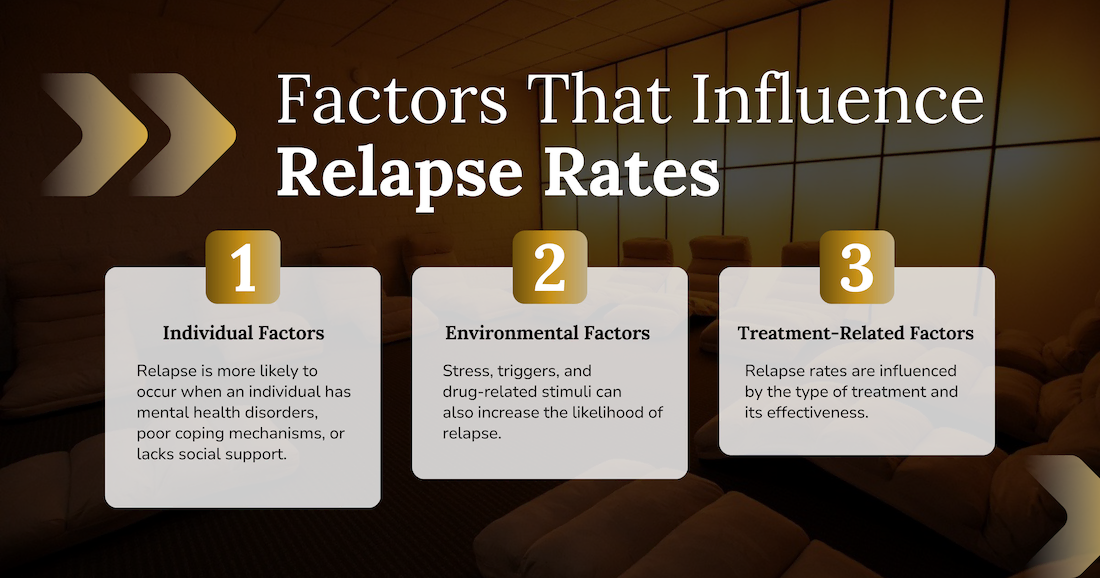Everyone isn’t a one-chip wonder. Treatment programs at rehabs tend to have a high return rate, no matter how effective they are.
But how many drug addicts relapse after rehab? Let’s take a look!
What’s a Relapse?
Relapse occurs when a recovering addict uses alcohol or drugs again after abstinence. A very common occurrence in addiction is relapse due to the difficulty of beating substance abuse.
There are no official guidelines on how long addicts must be sober before calling a slip a relapse. It is generally accepted, however, that abstinence is carried out with purpose just before relapsing.
It is important to remember that relapses are not failures, but rather stepping stones in the recovery process. With the right support and treatment, individuals can go back on track and progress toward lasting recovery.

Factors Influencing Relapse Rates
There are numerous factors that can influence an addict’s relapse rates, among them include:
Individual Factors
Relapse is more likely to occur when an individual has mental health disorders, poor coping mechanisms, or lacks social support. Relapse can be decreased by addressing these underlying issues during rehab.
Environmental Factors
Stress, triggers, and drug-related stimuli can also increase the likelihood of relapse. The development of coping mechanisms and assistance to aftercare programs is essential in preventing relapse due to environmental factors.
Treatment-Related Factors
Relapse rates are influenced by the type of treatment and its effectiveness. Treatment programs that address individual and environmental factors are more likely to work than those that are one-size-fits-all.
What Percentage of Drug Addicts Stay Clean After Rehab
Relapse Rates for Drug Addicts
If you’ve been wondering how many drug addicts relapse after rehab, then you are about to get the answer. The relapse rate for drug addicts after rehab is relatively high, with some research suggesting that up to 60% of individuals relapse.
In spite of this, it is vital to keep in mind that relapse rates depend on a variety of factors, which include the substance abused, the treatment program attended, and the individual.
There are many reasons why people relapse, but one of the most common is a lack of supportive environments.
A person who returns to the same environment they were in before rehab is more likely to relapse. A supportive environment that encourages sobriety and discourages drug use is crucial to preventing relapse.
Relapse can also be caused by the absence of aftercare services. After rehab, counseling and support groups help individuals maintain their sobriety and cope with everyday challenges.
Relapse Rates by Drug Type
It is possible for relapse rates to vary by the type of drug abused. It is possible for some drugs, such as heroin and cocaine, to have a higher relapse rate than others, such as marijuana.
The reason for this is that heroin and cocaine are highly addictive and can cause severe withdrawal symptoms and cravings. As a result, individuals have a harder time staying sober.
Additionally, some drugs, such as prescription opioids, can be just as addictive as heroin and cocaine.
The risk of relapse is high for individuals who abuse prescription opioids, especially if they don’t receive the proper treatment.
Building a Strong Foundation
Now that you know how many drug addicts relapse after rehab, you might have built an appreciation for the need to have a strong foundation. If so, you might want to take the first step to prevent relapses and start out your recovery in the best way possible.
The best way to avoid relapsing is to choose the right program for your recovery.
By preparing you with the tools you need to stay sober in the real world, the right program will help you avoid rehab. You will also have access to aftercare options, such as a strong community and ongoing therapy.
At Outpatient LA we are experts in treating addiction and helping our patients stay sober long after they leave our program.
Contact Outpatient today, and ask how we can help you build the right foundation for your recovery.


